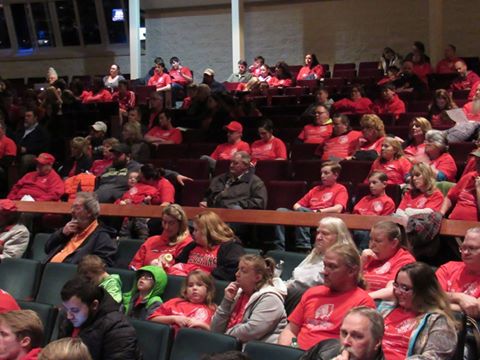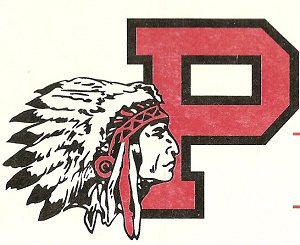
- Details
- By Levi Rickert
PAW PAW, Mich. — On Monday night, the Paw Paw Schools Board of Education at a regularly scheduled meeting voted 6-1 to get rid of the offensive Redsk*ns mascot at the end of the 2019-2020 school year.
Often referred to as “the R-word” in Indian Country, the Redsk*ns name and mascot imagery is opposed by the majority of American Indians. The R-word is offensive to many Native people and is sometimes compared to the N-word that African Americans oppose.

The fight to end the usage of the R-word mascot in Southwest Michigan began more than three years ago when a small handful of American Indians, including Monica Washington Padula, attended a coffee hour hosted by then Paw Paw Schools Superintendent Anthony Habra.
“I go back to asking Superintendent Habra at his coffee hour whether he supported justice for Native people, and him telling me that the town didn’t want to change,” Padula said after Monday night’s vote.
After that initial encounter, Washington and others mobilized an effort to push hard to have the mascot removed.
Several contentious community meetings were held where Paw Paw residents vowed never to retire the R-word. In one meeting, an elderly man stood up and angrily pointed to a crowd of American Indians and stated that he had some tar at home and if he had some feathers, he would tar and feather all of them.
In February 2017, the board voted to retain the R-word.
In recent weeks, there was movement internally at Paw Paw Schools to address the issue. In a newsletter sent to parents, Paw Paw Schools Superintendent Rick Reo last week said the school district’s nickname is preventing the district from realizing its true potential that welcomes, celebrates, supports and challenges all students.
On Monday’s meeting, Reo spoke before the vote and said:
“The Redsk*n name has been a great source of school pride for many, many Paw Paw students and fans over the years. But the reality we face and we can’t ignore is that our school community is divided with respect to the appropriateness of the Redsk*ns as a school nickname. More importantly, we need to acknowledge and address the impact this division is having on our school climate and learning environment.”
Paw Paw is a small southwest Michigan town that has used the R-word for 90 years. In a statement released Wednesday, the chairpersons of tribal nations in southwest Michigan — Matthew Wesaw of the Pokagon Band of Potawatomi, Jamie Stuck of the Nottawaseppi Huron Band of Potawatomi, and Bob Peters of the Match-E-Be-Nash-She-Wish Band of Pottawatomi — applauded the decision to retire the mascot name and imagery:
“Today, as we work to rebuild and reestablish our communities, we are bound together by our history, language, culture and traditions. Just as importantly, we strive to support and uphold positive healthy learning environments for our youth and inclusive resilient communities for our Tribal Citizens and their neighbors. We want to be a part of the healing and consultation process by providing insight to our culture, traditions and values with a solution-based approach.
The Michigan Coalition Against Racism in Sports & Media was pleased with Monday night’s decision.
Paw Paw school administrators have made the right decision in the best interest of students. Indigenous people exist today and can fully represent themselves without reductive stereotypes and imitation of our identities by others. Educators need to listen to scholars and read the studies that outline the negative effect of using mascots of a race of people, and act accordingly. Race-based sports mascots are a poor education policy,” Pokagon Band Potawatomi citizen and Michigan Coalition Against Racism in Sports & Media Julie Dye said.
After the school board’s decision, Reo recommended a student steering committee be formed to start the process of selecting a new nickname with the goal of a selection by July.
More Stories Like This
Native News Weekly (August 25, 2024): D.C. BriefsUS Presidents in Their Own Words Concerning American Indians
Native News Weekly (December 14, 2025): D.C. Briefs
Wounded Knee Massacre Site Protection Bill Passes Congress
Two Murdered on Colville Indian Reservation
Help us defend tribal sovereignty.
At Native News Online, our mission is rooted in telling the stories that strengthen sovereignty and uplift Indigenous voices — not just at year’s end, but every single day.
Because of your generosity last year, we were able to keep our reporters on the ground in tribal communities, at national gatherings and in the halls of Congress — covering the issues that matter most to Indian Country: sovereignty, culture, education, health and economic opportunity.
That support sustained us through a tough year in 2025. Now, as we look to the year ahead, we need your help right now to ensure warrior journalism remains strong — reporting that defends tribal sovereignty, amplifies Native truth, and holds power accountable.
 The stakes couldn't be higher. Your support keeps Native voices heard, Native stories told and Native sovereignty defended.
The stakes couldn't be higher. Your support keeps Native voices heard, Native stories told and Native sovereignty defended.
Stand with Warrior Journalism today.
Levi Rickert (Potawatomi), Editor & Publisher

